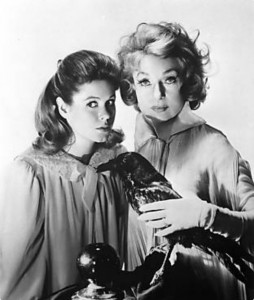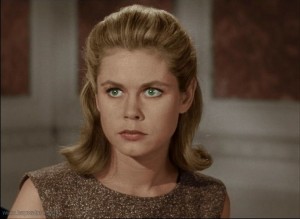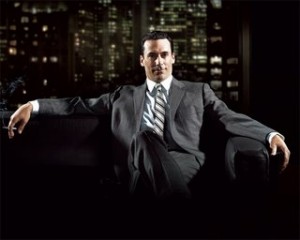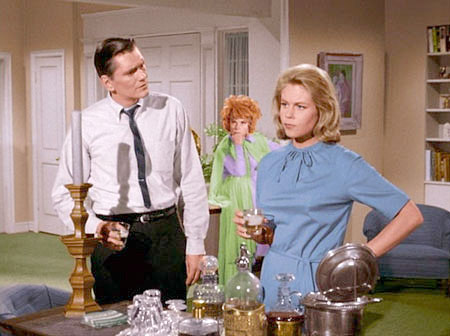Those of us who have made a commitment to popular culture are inevitably faced with a choice—to take a bit of entertainment at its face value, ignoring or discarding the aspects we find problematic, or to reimagine, rework or otherwise engage with the raw material to make it relevant to ourselves and our experiences. English-language comic book or television fans from virtually any time other than the past decade or so will be well-acquainted with this conundrum.
Bewitched, that sixties stalwart of witchery and sexual politics, is no exception to this dilemma. For those not in the know, the show is a 1964 situation-comedy about a witch of almost boundless power that willingly submits to life as a mortal to please her new husband. I’ve recently been rewatching the first season with Joy DeLyria, whose not-so-favorable appraisal of the show is heavy in omission and metaphor. And there’s plenty of metaphorical territory to be mined– Samantha’s inherited magical powers and other-ness could conceivably be stand-ins for a whole host of perceived problems; perhaps Samantha is Jewish, or Catholic, or is a Communist, or possesses an advanced degree, or some other similarly distancing and disturbing fact that must be hidden from the neighbors. But to look at the show’s premise metaphorically is to deny the deliciousness of the high-concept conceit itself—the delight of the metaphor made literal.
As Joy suggests, Bewitched is so thorough in its concept that invoking magical powers is hardly needed to suggest Samantha’s superiority to Darrin. She is literally, demonstrably, smarter, more attractive, more worldly and experienced, and even more creative than her bumbling, ineffectual husband, who, we are told, is a successful creative man at a fairly successful ad agency. (The evidence on the ground, however, is weak—some anemically rendered, under-realized concept sketches for campaigns that Pete Campbell himself would laugh out of a meeting room).
Samantha’s mother Endora effectively extends this argument for womanly superiority. Like her daughter, Endora is witty, intelligent, broadly skilled, and almost painfully attractive. Unlike her daughter, though, Endora is self-actualized, having taken her skills and self-assurance and tempered them in the crucible of independence. Endora does as she pleases, how and when she pleases, and with whom she pleases, for as long as it should please her. It’s this fierce, dangerous unpredictability that makes her a threat to the ineffectual Darrin, and to the social structure in which her daughter has chosen to play, if only for a little while.
And although it does so in a hesitant way, episodes of the show are not above teasing out some of the implications of the premise, including the radical concept that two beings with such powers and such long lives might look upon human beings in the way that humans do dogs — as animals that we have aligned ourselves with, are capable of having regard and even affection for, but will never truly see as equals. The show implies in several episodes that Endora is at least several millenia old, and that Samantha is already several hundred years old herself. Her husband, this man who desires normalcy so strongly that he will deny his wife her true self and the full realization of her abilities, and will even deny himself the luxury and power her skills might bring them, will himself age, quickly, gracelessly, a time-lapse photo, a blurry imitation of life compared to the richness of experience and pleasure that awaits Samantha. How can she possibly love this may-fly, this transitory creature, this animal that says so much and thinks so little? The only conclusion that is possible, a conclusion only occasionally made explicit in the show, is that Samantha is playing at being a human, not the way that a little boy and girl might play house with aprons and plastic food and furniture, rehearsing their future worlds, but the way an Olympic athlete might sit in on a pickup game of basketball, or an acclaimed novelist might pen some ad copy for her church potluck. And if Daren lives until he’s eighty, well, what’s fifty years to someone that will live for millennia? Samantha can be patient with all of Darrin’s whims, with his insecurities and his need to control every aspect of her action, because it’s part of the game of being human.
It is at this extreme that a metaphorical take on the show necessarily breaks down. Samantha might evoke the plight of intelligent, capable women of the early sixties and the lengths they had to go to conceal their true selves from their husbands, and cultures, but she’ll never literally be that woman. Samantha is ultimately safe from censure, from the consequences of the culture around her, even safe from physical harm, because of her magical powers.
At this point a different kind of literalist than myself might invoke intention. “The show’s not on their side!” this contrarian might insist. “Listen to the laugh track. Endora’s supposed to be funny, not right. She’s a caricature of the nightmare mother-in-law.” And while I’d have to concede that, yes, the presentation of the show can be problematic, I would argue that what a show seems to be saying through its laugh track, through its cinematography, is not necessarily the only thing it is saying. Some of this (mostly unrealized) potential for nuance is due to the writing, which can be quite sympathetic to the characters, but a great deal of it seems to rest on, and perhaps be inspired by, the outstanding performances of Elizabeth Montgomery as Samantha and the remarkable Agnes Moorehead, who positively sparkles as the noctiluminescent Endora. It doesn’t matter how you cut your footage or mix your laugh track– in a scene between Darrin and Endora, Darrin will forever be the bloodless, schlubby husband, Endora the preening, confident cat, a goddess in a world of garbage.
The Mad Men comparison is natural due primarily to Bewitched‘s setting and Darrin’s job as an ad man—the comparison is also instructive. It would be interesting to see what the unflinching eye of Mad Men would make of Darrin and Samantha’s relationship, what other consequences could be teased out of Samantha’s forfeiture of her powers. What would a merger of Sterling, Cooper, Draper, Price and McMann and Tate look like? How would Don Draper react to Samantha? His physical reaction is self-evident, but in addition to his much-remarked interest in the female form, he has a track record of recognition of the unrecognized, an ability to ferret out the abilities of others, and, when it is in his own interests to do so, help those others develop those abilities. But what would he make of a woman truly more than his equal, not only blessed with intelligence and insight and grace, but magical powers as well?
As for Samantha’s reaction to Don, I have no doubt she would have little interest in him, just as she shows little interest in her mother’s offers of setting her up with “some nice warlock”. Don is, after all, not unlike the warlocks we see on the show, in his arrogance, his swagger. It’s the arrogance that comes with true, unchallenged superiority, with having won every battle for a very long time; of being a god among the mortals.
No, Samantha would be content to do as she’s always done since she began to play in the sandbox of the flesh and blood—she would continue to love and care for her controlling, but doting husband, to play by his rules, in letter if not in spirit, for as long as he lives, caring for and condescending to him until he dies, at which point she can return once more to her mother, to her freedom, the world of the unbound.




